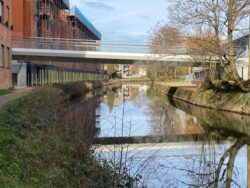 Abraham Lincoln
If given the truth, the people can be depended upon to meet any national crisis...
Abraham Lincoln
If given the truth, the people can be depended upon to meet any national crisis...
 Guildford news...
for Guildford people, brought to you by Guildford reporters - Guildford's own news service
Guildford news...
for Guildford people, brought to you by Guildford reporters - Guildford's own news service
Letter: GBC’s Debt Legacy is the Conservatives’
Published on: 13 Feb, 2024
Updated on: 17 Feb, 2024
From: Ben Paton
In response to: Why Is GBC Paying for Bridges?
John Murray asks who should pay for the Walnut and Ash Road bridges but the question should be who incurred the liabilities?
Guildford Borough Council gave a breakdown of the composition of its £300 million, medium-term debt. The largest component was Weyside Urban Village. That alone created an £80 million debt – with more in the pipeline.
See earlier Dragon coverage: GBC’s Lead Finance Councillor Answers on the Borough’s Financial Challenge and We Still Need More Clarity on GBC’s Finances
It is beyond dispute that the Guildford Conservatives created the liabilities making up the £300 million with the willing cooperation of the Guildford Liberal Democratss.
R4GV (Residents for Guildford & Villages) went along with its inheritance. But was it ever feasible to try to reverse projects like Weyside Urban Village? They are the legacy of a disastrous Local Plan.
The boasted prudence deployed by the Lib Dems and Conservatives has turned out to be an illusion. Not quite as bad as the Conservatives’ performance in Woking. But going in the same direction.
Operating surpluses in Local Government Accounts often just reflect the legacy of owning a large stock of Council Houses – where the rental income exceeds the outgoings. No one today in Guildford can take much credit for that. The Council Houses were built after WW2.
And there is now a pall of mismanagement, and possibly corruption, hanging over the council’s handling of its Housing Revenue Account into which is paid the council tenants’ rent. That did not arise overnight either.
Responses to Letter: GBC’s Debt Legacy is the Conservatives’
Leave a Comment Cancel replyPlease see our comments policy. All comments are moderated and may take time to appear.
Recent Articles
- Guildford Institute’s Crowdfunding Project for Accessible Toilet in its New Community and Wellbeing Centre
- Letter: Guildford – Another Opportunity Missed?
- Letter: GBC’s Corporate Strategy – Where Is the Ambition?
- My Memories of John Mayall at a Ground-breaking Gig in Guildford Nearly Six Decades Ago
- Westborough HMO Plans ‘Losing the Heart of the Street’ Says Resident
- College Invests to Boost Surrey’s Economy and Close Digital Skills Gap
- Community Lottery Brings Big Wins for Local Charities
- GBC Housing Plan Promises ‘A Vibrant Urban Neighbourhood’ Near Town Centre
- Hospital Pillows ‘Shortage’ at the Royal Surrey
- Updated: Caravans Set Up Camp at Ash Manor School


Recent Comments
- Ian Macpherson on Updated: Main Guildford to Godalming Road Closed Until August 1
- Sara Tokunaga on GBC Housing Plan Promises ‘A Vibrant Urban Neighbourhood’ Near Town Centre
- Michael Courtnage on Daily Mail Online Reports Guildford Has Highest-paid Council Officer
- Alan Judge on GBC Housing Plan Promises ‘A Vibrant Urban Neighbourhood’ Near Town Centre
- John Perkins on GBC Housing Plan Promises ‘A Vibrant Urban Neighbourhood’ Near Town Centre
- S Collins on GBC Housing Plan Promises ‘A Vibrant Urban Neighbourhood’ Near Town Centre
Search in Site
Media Gallery
Dragon Interview: Local Artist Leaves Her Mark At One of England’s Most Historic Buildings
January 21, 2023 / No Comment / Read MoreDragon Interview: Lib Dem Planning Chair: ‘Current Policy Doesn’t Work for Local People’
January 19, 2023 / No Comment / Read MoreA3 Tunnel in Guildford ‘Necessary’ for New Homes, Says Guildford’s MP
January 10, 2023 / No Comment / Read More‘Madness’ for London Road Scheme to Go Ahead Against ‘Huge Opposition’, Says SCC Leader
January 6, 2023 / No Comment / Read MoreCouncillor’s Son Starts Campaign for More Consultation on North Street Plan
December 30, 2022 / No Comment / Read MoreCounty Council Climbs Down Over London Road Works – Further ‘Engagement’ Period Announced
December 14, 2022 / No Comment / Read MoreDragon Interview: GBC Reaction to the Government’s Expected Decision to Relax Housing Targets
December 7, 2022 / No Comment / Read MoreHow Can Our Town Centre Businesses Recover? Watch the Shop Front Debate
May 18, 2020 / No Comment / Read More











John Murray
February 15, 2024 at 4:59 pm
I never asked about payment for any bridges, that was Mrs Coleman to whose enquiry John Redpath was responding. All I did was draw attention to the operating results for the council under the last Tory administration and under the subsequent coalition. I am not sure what is the significance of one aspect of income (council housing) as there are multiple income streams and my point is that spending more than income will eventually lead to problems regardless of the source of the income.
As regards borrowing, this was (short-term and long-term) £213.9million when the Tories last took office in 2015 and had fallen to £213.0million by 2019 when the coalition took over. No great achievement, I agree, but by March 2023 the figure had risen by £82.3millions to £295.3million.
If the coalition chose not to revoke the WUV plan then they must have thought that it was a good idea.